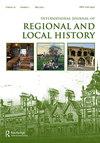The Hawai’ian Sugar Planters’ Association and the Herbert River Farmers’ Association: Regional Articulations of Agricultural Associations on the Periphery
Q2 Arts and Humanities
International Journal of Regional and Local History
Pub Date : 2020-07-02
DOI:10.1080/20514530.2020.1835062
引用次数: 0
Abstract
ABSTRACT In the nineteenth century the stereotypical association representing sugarcane growers was a planters’ association, the epitome of which, was the Hawai’ian Sugar Planters’ Association. The Herbert River Farmers’ Association, formed by a group of small farmers in the tropical north of Australia, was the antithesis. This is because they represented two distinct modes of agricultural production, the plantation and the small farm. Both inherited their associative traditions from the British Isles. Much of agricultural association scholarship has had a tendency to focus on associations formed by the elite and studies of regional and local small agricultural associations are scattered and uncoordinated. Drawing upon the Hawai’ian and Australian sugarcane industries this article explores the differing modes of production adopted in each to explain why their agricultural associations took different paths. Hawai’i and north Queensland offer a unique context for a comparative examination of associational behaviour on the colonial periphery.夏威夷甘蔗种植商协会和赫伯特河农民协会:周边农业协会的区域联系
摘要在19世纪,代表甘蔗种植者的刻板印象是种植商协会,夏威夷甘蔗种植商协会就是其中的一个缩影。赫伯特河农民协会是由澳大利亚热带北部的一群小农民组成的,与此相反。这是因为它们代表了两种不同的农业生产模式,种植园和小农场。两者都继承了不列颠群岛的联想传统。农业协会的学术大多倾向于关注精英组成的协会,而对地区和地方小型农业协会的研究则分散且不协调。本文借鉴夏威夷和澳大利亚的甘蔗产业,探讨了各自采用的不同生产模式,以解释为什么他们的农业协会采取不同的道路。夏威夷和北昆士兰提供了一个独特的背景,可以对殖民地周边的联想行为进行比较研究。
本文章由计算机程序翻译,如有差异,请以英文原文为准。
求助全文
约1分钟内获得全文
求助全文
来源期刊

International Journal of Regional and Local History
Arts and Humanities-History
CiteScore
0.30
自引率
0.00%
发文量
10
期刊介绍:
The International Journal of Regional and Local History aims to publish high-quality academic articles which address the history of regions and localities in the medieval, early-modern and modern eras. Regional and local are defined in broad terms, encouraging their examination in both urban and rural contexts, and as administrative, cultural and geographical entities. Regional histories may transcend both local and national boundaries, and offer a means of interrogating the temporality of such structures. Such histories might broaden understandings arrived at through a national focus or help develop agendas for future exploration. The subject matter of regional and local histories invites a number of methodological approaches including oral history, comparative history, cultural history and history from below. We welcome contributions situated in these methodological frameworks but are also keen to elicit inter-disciplinary work which seeks to understand the history of regions or localities through the methodologies of geography, sociology or cultural studies. The journal also publishes book reviews and review articles on themes relating to regional or local history.
 求助内容:
求助内容: 应助结果提醒方式:
应助结果提醒方式:


